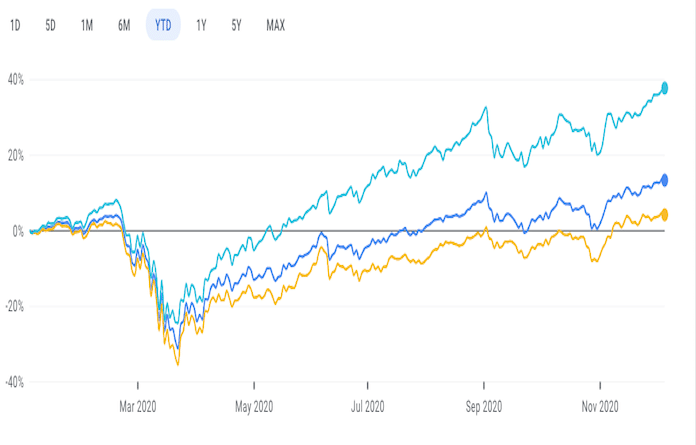Stock market rise explained

Those who pay attention to it have seen an interesting phenomena occur with the stock market this year.
The coronavirus pandemic has crippled economies across the world, yet the market has had a decent year.
The Congressional Budget Office reports the “disruption” and “sharp economic contraction brought on by the coronavirus pandemic has caused the fiscal outlook for state, local, tribal and territorial governments to deteriorate significantly,” which is evidence of the overall struggles of the economy.
Additionally, the Bureau of Labor and Statistics reported last month that, as of November, the unemployment rate is still 6.7 percent and 10.7 million people are unemployed.
Both numbers have dropped for seven straight months, but they are still nearly double what they were in February before COVID-19 struck America.
Despite those indicators of economic hardship, the stock market has fared much better, making gains for the year overall.
The S&P 500 index, which measures the stock performance of 500 large companies in the U.S., ended November at 3,621.63, up 363.78 points for the year. It had its best November ever this year.
Likewise, the Dow Jones Industrial Average, which measures the performance of 30 large companies listed in the U.S. stock exchange, ended November at 29,638.64 after having its best month since 1987. The Dow is up 769.84 points overall for the year.
Finally, the Nasdaq Composite, which includes many smaller stocks, was up to 12,197.74 on Monday after starting 2020 at 9,092.19. That means it has risen 3,105.55 points so far this year.
Experts do not agree on why there has been such a disconnect between the economy and stock market, though there are several theories.
“The economy is more of a reflection of today,” Edward Jones Financial Advisor Collin Moore of Waterloo reasoned. “The market has always been a forward-looking vehicle. It looks for tomorrow and where we’re going with things.”
Dwight Schaefer, the president of Schaefer Wealth Management in Waterloo, said there are “several factors” contributing to the market’s success, with a key one being the Paycheck Protection Program.
“I think that kept a lot of people employed through the worst time in March, April and May,” he said. “I think that helped significantly because people were employed and still making money and contributing to their 401Ks and not feeling the economic pressure.”
One of the more common educated guesses for why the stock market has succeeded despite the pandemic is that it is being boosted by stocks like Amazon and other technology companies that have seen business improve this year.
A Monroe County investment expert who asked to be kept anonymous to speak candidly said that is particularly noticeable on the S&P 500 because it is a weighted index.
“There’s a handful of stocks that have a very heavy weighting on the index,” this expert said. “If you take out the tech-driven stocks at the top of it… you’ll find out the market really isn’t up like you think.”
Moore described this year’s market as having a somewhat “lopsided recovery” because of tech companies.
He also said this year could mark the beginning of a “dynamic shift in how corporate America does business.”
“We didn’t normally look at tech as the place to go when things get rough,” he explained. “Usually we fall back on utilities, energy companies and banks. Quite the opposite has happened. Tech allowed us to survive this virus and pandemic as far as business goes. We’re doing a lot more with technology.”
Another frequent explanation is that the Federal Reserve System, the central banking system of America, has kept interest rates low throughout the year, boosting the stock market.
The anonymous source did not put as much stock in that reasoning, but Moore said it was one of three main factors for the market’s success.
“The Federal Reserve has said ‘we’re not going to slow down this recovery. We’re not going to push interest rates higher,’” Moore said.
Schaefer had a different viewpoint.
“I think that’s helped over the last several years, but it’s also hurt people who are safe savers,” he said. “I have an issue with the Fed. I don’t think they should be manipulating. I think the market should be determining itself.”
Schaefer also credited the Fed with ensuring there was money available for companies.
Moore also attributed the market’s success to the pent-up demand with people having to stay home and businesses being shut down.
He also said the third common theory for the stock market’s boom has merit to it. That reason is optimism about a COVID-19 vaccine.
“This worldwide drive to find a vaccine and treat coronavirus could in turn result in a lot of discoveries being made with all this money being spent on (research and development) by these companies,” Moore argued. “That could have a significant impact on the health care field moving forward.”
A component of the idea that optimism about the future is helping the market is that the tumultuous election season has passed.
Schaefer said any optimism usually helps the market.
“I think optimism is very good and uncertainty is a negative to the market,” he said. “So the more certainty people have about things, whether it’s a vaccine or the direction of the government or the government gridlock that’s still in place, is helping people alleviate some of that fear.”
Moore downplayed the significance of politics, saying the same conversation happens each election cycle.
“The party in office has never determined where the economy is going to go. The economy is based on entrepreneurs, new ideas and you and I needing new products and services,” he said. “More often than not, the election news just gets in the way and we make bad emotional decisions.”
Looking ahead, some experts believe a recession may be on the horizon with all the chaos that has defined 2020.
The anonymous expert said a recession would most likely just be part of the ebbs and flows of the market. Moore said predicting a recession is “always hard to do” and Schaefer said a recession is “always possible.”
Given all the uncertainty of this year, all three experts offered some general advice.
“I’m a firm believer that you have to be looking forward right now instead of backwards and looking at what I refer to as ‘next-generation stocks,’” the anonymous expert said. “In other words, you don’t want to look backwards at the ones that got us here only. You want to keep those, a lot of them, but you also want to look at the ones that are going to be leading us forward.”
Moore said his philosophy throughout 2020 has remained the same as in any year.
“Maintain a quality, diversified portfolio of high-quality investments,” Moore advised. “Re-balance when necessary. And my philosophy has always been time in the market has always been better than trying to time the market. Get in, invest properly, buy good stock and hang in for the long haul.”
Schaefer’s suggestion closely mirrored Moore’s.
“My focus is always long-term,” he said. “You diversify according to your risk tolerance. Your goals and objectives stay long-term, and make sure you diversify in a lot of different areas of investment.”






